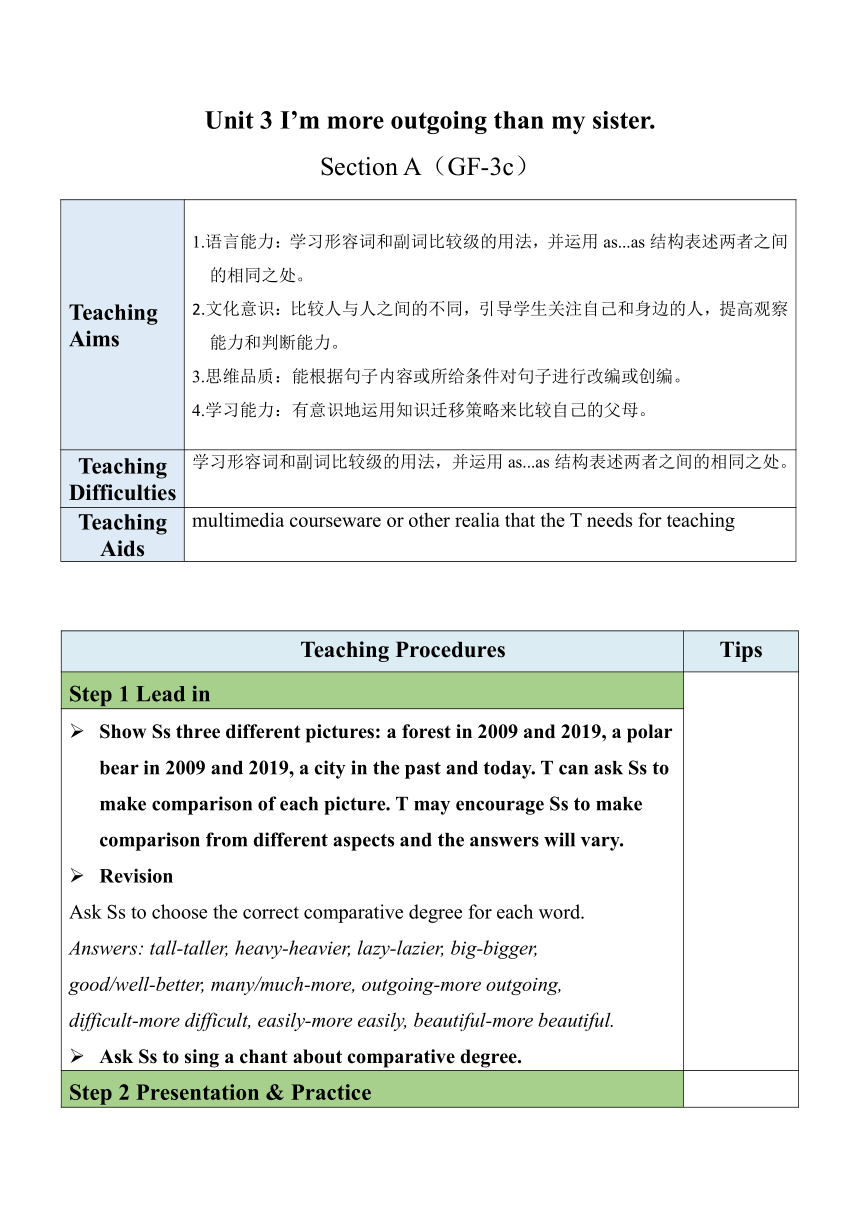
Unit 3 I’m more outgoing than my sister. Section A(GF-3c) Teaching Aims 1.语言能力:学习形容词和副词比较级的用法,并运用as...as结构表述两者之间的相同之处。 2.文化意识:比较人与人之间的不同,引导学生关注自己和身边的人,提高观察能力和判断能力。 3.思维品质:能根据句子内容或所给条件对句子进行改编或创编。 4.学习能力:有意识地运用知识迁移策略来比较自己的父母。 Teaching Difficulties 学习形容词和副词比较级的用法,并运用as...as结构表述两者之间的相同之处。 Teaching Aids multimedia courseware or other realia that the T needs for teaching Teaching Procedures Tips Step 1 Lead in Show Ss three different pictures: a forest in 2009 and 2019, a polar bear in 2009 and 2019, a city in the past and today. T can ask Ss to make comparison of each picture. T may encourage Ss to make comparison from different aspects and the answers will vary. Revision Ask Ss to choose the correct comparative degree for each word. Answers: tall-taller, heavy-heavier, lazy-lazier, big-bigger, good/well-better, many/much-more, outgoing-more outgoing, difficult-more difficult, easily-more easily, beautiful-more beautiful. Ask Ss to sing a chant about comparative degree. Step 2 Presentation & Practice Grammar Focus Ask Ss to read the sentences in Grammar Focus. Ask them to underline the adjectives and circle the adverbs. Tell Ss that adjectives usually go with the verb be, adverbs modify the verbs and it usually go after the verbs. 3a Ask Ss to use the words to write questions and answers. Answers: 2. Does Jack run as fast as Sam No, he doesn’t. He runs faster than Sam. 3. Is your cousin as outgoing as you No, she isn’t. She’s more outgoing than me. 4. Is Paul as funny as Carol No, he isn’t. He’s funnier than Carol. 3b Ask Ss to think of themselves two years ago. Write about how they are different now. Answers will vary. 3c Ask Ss to compare their parents. Check who is smarter, funnier, etc. Then ask Ss to ask their partner about his/her parents. Answers will vary. Step 3 Language points learning 形容词和副词的比较等级 大多数形容词和副词有三个等级: 1. 原级,即原形。e.g. good, fast, outgoing ... 2. 比较级,表示“较......” 或“更......一些”。 e.g. better, faster, more outgoing ... 3. 最高级,表示“最......”。 e.g. best, fastest, most outgoing ... 比较级构成的规则变化 单音节词和部分双音节词: 一般在词尾加-er, 以字母e结尾的词加-r , 重读闭音节词词尾只有一个辅音字母时,先双写该辅音字母,再加-er, 以“辅音字母+y”结尾的双音节词,变“y” 为 “i”,再加-er。 多音节词和部分双音节词在其前面加more。 比较级构成的不规则变化 good / well-better, bad / badly-worse, many / much-more, little-less, old-older / elder, far-farther / further 易混淆辨别 older与elder的区别在于:old是形容词,表示“更老;更旧;年纪更大”,一般用来形容人、动物或物体(不限于形容家人),常与than连用。它不表示职务、地位和资历,也更口语化。elder既可以作形容词也可以作名词,表示“年龄更大”(但不一定是更老)一般只形容人,尤其是家人。它不与than连用,可表示职务地位资历更高,也更正式。 farther与further的区别在于:farther表示距离上更 ... ...
~~ 您好,已阅读到文档的结尾了 ~~